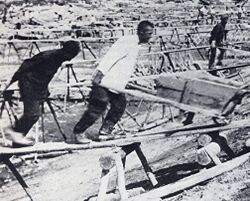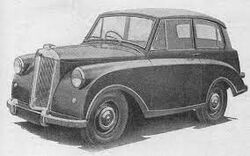People's Republic of Dau Sel
This article is incomplete because it is pending further input from participants, or it is a work-in-progress by one author. Please comment on this article's talk page to share your input, comments and questions. Note: To contribute to this article, you may need to seek help from the author(s) of this page. |
People's Republic of Dau Sel Poblacht Mhuintir na Dæsala | |
|---|---|
| 1892–1988 | |
|
Flag | |
| Government | Single Party Socialist Republic |
| Historical era | 20th Century |
• Established | September 3 1892 |
• Disestablished | August 13 1988 |
The People's Republic of Dau Sel, was located in the northeast of Nori within the region of Greater Olympus from 1892 - 1988. It was succeeded by the current Socialist Republic of Dau Sel. It's capital city was Hobhdbi.
History
Dau Selan Revolution
In first half of 1887 Dau Sel was hit with a severe drought that drastically hampered the nation's agricultural output. At the time most Dau Selans worked on lands that were legally owned by wealthy elites in exchange for a fixed amount of crops that the owners would then sell for a profit. Due to the drought most were unable to make their required payments and those that were able to didn't have enough left over in order to support themselves or their families. As the field workers had little to no crops of their own to sell they had precious little to spend on necessities such as food. This caused local food prices to plummet. As a response the field owners opted to sell what crops they did have in foreign markets to try to get a higher price, greatly exacerbating what had become a nationwide food shortage.
The Dau Selan people protested for Emperor Steafan III to intervene but he had many friends within the land owners and chose not to interfere. Further protests were staged in the cities of southern Dau Sel but these were usually broken up by either soldiers or mercenaries hired by the land owners. By the winter of 1887 it is estimated that approximately 5,500,000 Dau Selans had starved to death with several million more fleeing the country. Over the winter the tension appeared to have died down however the unrest would return the following year.
As winter turned to spring in 1888 field workers were sent out to sow the fields for that years harvest. Things were looking hopeful as the rains had returned and the crops grew strong over the following months. By August it is estimated that the crop yields had rebounded almost to their 1886 levels, however, come October 1 (the day when crops are due to the field owners) a majority of field workers refused to surrender any. Local communities organized militias in order to defend their crops from the mercenaries and later soldiers who would try to confiscate them. It was during this period in the autumn of 1888 that large scale violence had officially erupted.
The militias were determined but could not match the fighting skill of the trained soldiers. To compensate the militias quickly switched to using guerilla tactics in order to pick off soldiers, disrupt supply lines, and hamper enemy morale. Small communities would often house informants for the militias, spreading word of troop movements and possible plans. During this period the militias began adopting a green flag as a symbol for their cause.
On September 1, 1892 the Royalists officially surrendered to the People's Revolutionary Army.
Early Years
On September 3, 1892 the People's Republic of Dau Sel was declared and Cináed Donaghue was named the inaugural Prime Minister of the People's Republic. After this, the Revolutionary Socialist Party and the rest of the provisional government set to work drafting a constitution for the new People's Republic. There were significant disagreements as to how this new government should be structured but Prime Minister Donaghue was able to unite the RSP behind his vision and use their significant numbers in the provisional government to pass desired reforms. Many non-RSP members of the government opposed what they saw as Donaghue steamrolling through the democratic process and left in opposition. By early November the new Constitution of the People's Republic of Dau Sel had been ratified. After this the remaining non-RSP members of the government resigned. It is unclear whether this was out of protest or if they had been pressured into doing so.
Shortly following the surrender of the Royalists the provisional government enacted a series of policies that would lead to a period of time known as The Terrors. During this time royalist supporters, nobility, and those who spoke out against the revolution were rounded up and either executed or shipped off to prison labor camps in Dau Sel's rural Kiranian provinces. As this region was still very sparsely inhabited and lacked infrastructure many prisoners were tasked with felling trees and creating dirt paths deep into the wilderness. Many died due to exhaustion and dehydration. When arriving at the locations for the camps the prisoners were once again tasked with clearing the land. Security in these camps was minimal as the vast expanses of wilderness and freezing winter temperatures were strong enough to deter most from leaving the camp. It is estimated that by 1905 the Dau Selan population had fallen from approximately 45,000,000 in 1885 to just 33,000,000 due to a mix of famine, emigration, and violence. As of 2021, the population has still not reached pre-1887 levels.
As power was being solidified the main focus of governance was the matter of food security. The provisional government enacted sweeping agricultural reforms that included land redistribution and major restrictions on the exporting of food. As these restrictions made it near impossible to sell food on the international market and domestic prices were too low to turn a profit, many farmers converted excess crops into alcohol. The alcohol industry was far less regulated than the food industry allowing vodka, beer, and lingonberry wine distilleries to pop up and become incredibly popular. This would mark the beginning of Dau Sel's history with alcoholism.
Alcoholism rates rose steadily until around 1920 when they plateaued and essentially remained constant until the reconstruction in 1988. It is believed that cheap alcohol and a lack of alternative entertainment led to these high rates. Alcoholism has been steadily declining since major industry reforms in 1990. Higher taxes on alcohol has led to many farmers to instead switch focus to producing livestock feed instead of crops for alcohol, though there is still a substantial alcohol industry.
As the RSP was working to ensure food security for the nation increasing output became a major focus. It was decided that some of the vast swathes of untouched wilderness in Dau Sel's north would be the site of some of the new state run farms. Like the work camps, these too would initially be established and run by prison labor, however, as years passed and prisoner numbers decreased these farms transitioned to being operated by citizens shipped in from other regions.
On October 7, 1911 Donaghue was found dead in his study. He had died of a stroke. A state funeral was held in the capital of Príombar which was attended by over 100,000 people. The nation had had 3 days of mourning following funerary services. On October 11, 1911 Allan McAfee was named party leader and the new Prime Minister of the People's Republic.
Oil was first discovered in Dau Sel in 1914 by a work crew clearing land. This led to an explosion of interest in the northern reaches of the country. State survey crews were dispatched all across the region to asses the size of the nation's oil reserves. Over the next few decades land would be cleared and more roads would be made to establish oil wells and transport the crude oil closer to the nation's trade hubs.
Prior to the discovery of oil the northern region's remoteness was considered an asset but now it was severely hampering production. In order to boost the burgeoning oil industry in the nation, and assist with agricultural output in the region, then PM Allan McAfee tasked the nation's engineers with establishing a system of rail to connect all regions. It was important that this system would function for both freight and passenger use as transporting laborers to the northern farms had been an issue since their creation.
Innealra Talmhaíochta na Dæsala (Dau Selan Agricultural Machinery), a state run company that had been founded in the early years of the PRDS to produce agricultural equipment for the ever expanding number of farms, began utilizing the newly discovered oil reserves shortly after their discovery. By the early 1920s ITD had produced a line of motorized threshers, tractors, and reapers. In 1926 ITD released the first of their work vehicles, the Iompróir-26. In 1932 the motor vehicle department of ITD was split off as Mótarfheithiclí na Dæsala (Dau Selan Motor Vehicles). MD was primarily tasked with creating work vehicles, military transport vehicles, and busses until 1952 when they released the first Feithicil Úsáide Poiblí the FÚP-52. The FÚP-52 was designed as a cheap, reliable vehicle for citizens of Dau Sel. As this was the first car that most Dau Selans would have access to it sold quite well, however, it's bland style, lack of features, and loud diesel engine made it very unpopular internationally. The FÚP-52 was designed to be easy to repair, which was convenient as they were known to frequently require maintenance.
Final Years
By the mid 1980s support for the government had reached its lowest point since the revolution. As unrest grew, Prime Minister Fionn Thorstein felt that something drastic would have to happen to prevent complete revolt. On May 14, 1988 Thorstein implemented An Scail (The Opening) greatly reducing press censorship, promoting government transparency, and legalizing opposition parties. To coincide with this opening of the political process elections were scheduled for August 1 of that year. The RSP subsequently lost control of the Reonadaí Hach to the new Socialist Democracy Party (SDP). On September 1 of 1988 Brigid Ó Coaglin was sworn in as the first non-RSP Prime Minister of Dau Sel.
The SDP passed major reforms in the autumn of 1988 known as An Atógal (The Reconstruction). These reforms included significant reworking of the political and economic systems, officially changing the name of the country to The Socialist Republic of Dau Sel, and changing the flag to the current striped version. The Reconstruction was broken into 9 sections which are referenced in the 9 stripes added to the old green banner.





